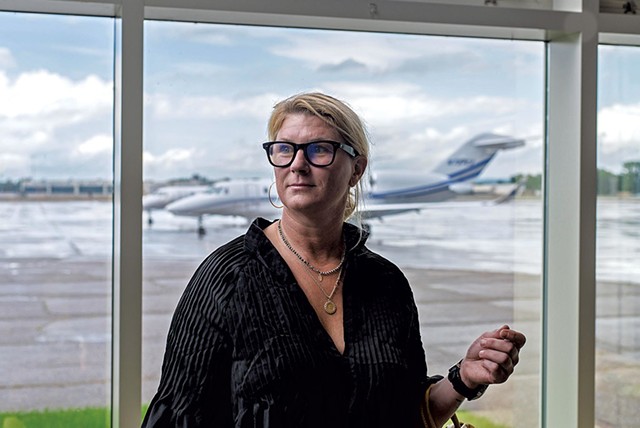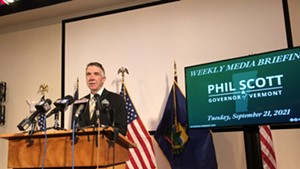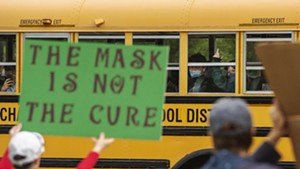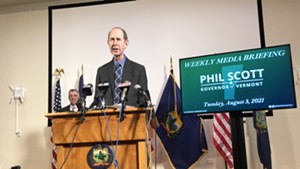
- Glenn Russell
- Jamie Wilhite
Joe Sutton, who owns the Waybury Inn in East Middlebury, removed his signage on COVID-19 safety measures in June, when Gov. Phil Scott lifted all pandemic restrictions. But with case counts rising, the signs are back up again.
In 2020 and the first half of 2021, Vermont restaurants were required to follow state protocols about masking, distancing and occupancy limits, so Sutton was in step with his peers. Now, in the absence of a state mandate regarding masks or other safety measures, "it's kind of everyone on their own," Sutton said. He worries his choices will alienate customers.
"Some guests will go to one place because they don't require a mask; another guest will only go to, say, our place because we do require a mask," said Sutton, who can seat 150 in the tavern and dining rooms associated with his 12-room inn. "It was much easier for us when there were firm directions from the Statehouse."
Since COVID-19 case counts started rising in July, Scott has been under increasing pressure from the public, school officials and parents to hand down safety rules, not just recommendations.
Now business owners, on the verge of what could be a busy fall season, are trying to determine how best to stay open while keeping customers, the community and staff members safe.
Health Commissioner Mark Levine said on Tuesday that he recommends all people, regardless of vaccination status, wear masks indoors. But he also recognized that people have a right to choose for themselves.
Some business owners say that stance isn't strong enough: They want a mask requirement.
"None of us are scientists; none of us are epidemiologists," said Johnny Lotti, who co-owns Café Lotti in East Burke, speaking of restaurant and small business owners. "We rely on other people to get that information. We don't have the data to make those decisions, but they do."
Like other states, Vermont is entering the fall in a situation few expected. Many people started the summer with a sense of elation, believing they could safely resume activities they'd been missing. Citing the highest vaccination rate in the country and the lowest hospitalization rate, the Scott administration urged Vermonters to go out and enjoy gathering again.
Yet an uptick in so-called "breakthrough cases" — infections in vaccinated people — has many concerned that the pandemic is roaring back to life. And Vermonters under age 12, who returned to the classroom last week, are ineligible to get vaccinated.
As of Tuesday, the Vermont Department of Health reported that 2,724 people in the state had tested positive for COVID-19 in August. Of those, 1,105, or about 40 percent, were fully vaccinated. During the same time period, 16 people died with COVID-19. The health department has refused to say how many were vaccinated, citing privacy concerns.
Scott and his cabinet have remained upbeat at his weekly press briefings, insisting that case numbers will soon peak and start dropping, as they have in other states with surges brought on by the Delta variant.
Not everyone shares that positive outlook.
As the first day of school approached, House Speaker Jill Krowinski (D-Burlington) and Senate President Pro Tempore Becca Balint (D-Windham) both pressed Scott to take further steps to protect Vermonters, including a possible indoor mask mandate.
Asked about the lawmakers' request at his August 24 COVID-19 briefing, Scott said that he is trying to keep politics out of the state's COVID-19 response.
But there's turmoil even within the state Department of Health, which has led the pandemic response. Last week, more than 90 staffers signed a letter addressed to Health Commissioner Levine, Deputy Commissioner Kelly Dougherty and state epidemiologist Patsy Kelso, urging them to take a stronger stance on preventative virus measures. School districts, for instance, have been left to create their own policies, with just two pages of recommendations from the state. Some are already sending kids home because of COVID-19 cases.
The Vermont Department of Corrections, meanwhile, has reimposed a system-wide mask mandate in its prisons after dozens of inmates and staff recently tested positive for the virus. Effective on Wednesday, September 1, about 1,000 corrections employees must attest that they've been vaccinated or take a COVID-19 test every week and wear a mask. Scott said he's considering a similar policy for other state employees.
To those who insist a statewide mask mandate is needed, Scott continues to counter that Vermont's high vaccination rate makes mandates unnecessary. As of Tuesday, 86 percent of eligible residents had had at least one dose. The governor has said the vaccine was never intended to eliminate the virus, and continued infections were expected. The vaccine greatly lessens the risk of infection and the worst outcomes — severe illness, hospitalization and death.
The administration has counseled Vermonters to start thinking of the COVID-19 virus as endemic, something that will lurk in the background, continuing to cause some infections the way the flu does now. Some people are already getting booster vaccine shots, an effort that is expected to expand soon.
For those reasons, Scott has resisted calls to renew the state of emergency, which expired in June after he lifted all pandemic restrictions.
"We can't be in a perpetual state of emergency; it's not conducive to good government," the governor said on Tuesday. He noted that the state has been contending with the virus for 18 months and has learned important lessons.
"We now have somewhat of a playbook," he said. "We know what works, and we're going to have to deal with this for, probably, years to come."
Some municipalities have tried to take matters into their own hands. The Brattleboro Selectboard in August passed a resolution to impose a town-wide mask mandate, in both municipal buildings and private business. But the Scott administration shot down the request, citing the absence of a state of emergency and the town's low COVID-19 case rate.
In Montpelier, the city council requires masks inside city-owned buildings, though it hasn't asked local businesses to follow suit.
Burlington Mayor Miro Weinberger has recommended that people wear masks indoors in public and has required that city employees do so. He floated the idea of a citywide mask mandate last month, then held a roundtable with city business owners to hear their thoughts.
Some who attended said they would rather the state stayed out of the mask discussion.
"What's the point?" David Melincoff, who owns Sweetwaters restaurant, asked in an interview after the event. Melincoff said he doesn't have anything against masks. But now that he doesn't have to require them indoors, he doesn't. When he did require them last year, customers often argued with staff when asked to put them on. Others ignored the rules.
"I think, at this point in time, it's a personal choice," he said.
During the forum, Weinberger said he's taking the unexpected spike in cases seriously, and he thinks the state does need to reevaluate what it is doing to contain infections. But he doesn't think a statewide mandate is the answer.
"The governor is right not to be declaring a new emergency," Weinberger said. Despite the fact that case numbers are rising rapidly, "what was an emergency in April isn't an emergency today because of the high level of vaccination."
Like Brattleboro, Burlington would need permission from the governor to impose a citywide mandate. Dan Cunningham, who owns an investment management company in Burlington, said public officials should be looking at the death rate among the vaccinated, not the infection rate. Cunningham said the former is so low that there shouldn't be any safety mandates.
"We can't all sit around in this purgatory forever of wearing masks and sort of debating with each other," said Cunningham, who has four children in middle and high school. "What is the strategy here? Are we going to try to get to a zero-infection society? In the context of any disease, that would be considered absurd."
Back in Brattleboro, businesses are left to fend for themselves — though many are choosing to require masks.
"I just walked up and down Main Street, and there are more and more stores putting up their own little signs," said Barbara Walsh, who co-owns Brattleboro Bicycle Shop. "Whereas before, we had this town-wide mandate, and people didn't have to wonder which store they could go into."
If people enter Walsh's store without a mask, she hands them one.
Café Lotti, the East Burke eatery, only recommends that people wear masks because the policy isn't backed up by a statewide rule, co-owner Linda Lotti said. When she did require masks earlier this year, some customers objected, saying they were fully vaccinated. On Monday, she started requiring her staff to wear masks.
"We feel the only thing we can do right now is encourage our customers to wear masks," she said.
The Vermont Retail & Grocers Association isn't taking a position, president Erin Sigrist said.
"If businesses feel they want to share their position with the governor, we certainly put them in touch with the administration," Sigrist said. "But we're not pounding on his door asking him to make any changes. We feel he's so far done a pretty good job."
But the Vermont League of Cities & Towns thinks municipalities should be able to make their own decisions about safety measures, without a go-ahead from Scott.
"In the absence of a statewide mask mandate, or other emergency order, it would be appropriate for communities to have the ability to implement emergency measures that their governing bodies thought best," said Ted Brady, the group's executive director.
"There is a process in place that allows communities to implement public health measures. Ideally, the commissioner of health would approve them," Brady said. "In the Brattleboro case, it's clear what they have done is in compliance with the [Centers for Disease Control and Prevention] guidance. If the commissioner of health wants to say 'no' to that, I'd simply hope there would be an explanation as to why."
Even if the administration does standardize masking rules for the whole state, that won't uncomplicate things for Jamie Wilhite, an agent with Notch Above Tours in Burlington. She's working full time to update passengers on the regulations in the states they will be visiting, and to make sure restaurants and other businesses will take them in as planned when their bus pulls up. Many restaurants are cutting back their hours because of staffing shortages; others are closing after an employee reports a positive COVID-19 test.
"We have gotten accustomed to being moment by moment," said Wilhite, who last week was putting the final touches on the itinerary for a group from Oregon due to arrive in Vermont on September 1. She was keenly aware that Vermont's COVID-19 case numbers were at highs not seen since April. Customers were asking how they could know whether everyone else on the bus was vaccinated.
With case counts still rising, she doesn't know what to expect from day to day.
"Hopefully, God willing, they will come," Wilhite said of the group.















Comments
Comments are closed.
From 2014-2020, Seven Days allowed readers to comment on all stories posted on our website. While we've appreciated the suggestions and insights, right now Seven Days is prioritizing our core mission — producing high-quality, responsible local journalism — over moderating online debates between readers.
To criticize, correct or praise our reporting, please send us a letter to the editor or send us a tip. We’ll check it out and report the results.
Online comments may return when we have better tech tools for managing them. Thanks for reading.